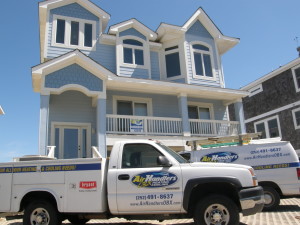Now that your heating system is ready for winter, and you know how not to set your house on fire, Air Handlers OBX is here to tell you (by way of the US Energy Information Administration (EIA) that it’s quite likely you’ll pay less to heat your home this winter.
After the unusually cold winter of 2013-14, U.S. households can expect lower heating expenditures this winter (October through March) compared with last winter. According to EIA’s Short-Term Energy and Winter Fuels Outlook, average household expenditures for homes heating primarily with natural gas will total $649 this winter, a $31 decline from last winter’s average. Homes heating primarily with electric heat are expected to spend $938 ($17 less). Homes using propane or heating oil have higher expenditures on average ($1,724 and $1,992, respectively) than homes using natural gas and electricity, but still lower ($652 less and $362 less, respectively) compared to last year.
Rejoice, as this is largely due to fewer extreme weather patterns compared to last year: “According to the latest forecast from the National Oceanic and Atmospheric Administration (NOAA), temperatures are expected to be warmer than last winter. The extreme weather patterns last winter elevated demand for all heating fuels, led to a drawdown of inventories, and put upward pressure on prices.”
Keep in mind though that predictions are just that: Predictions. And sometimes they’re wrong. Luckily, the EIA’s Winter Fuels Outlook has accounted for this:
Because weather patterns present great uncertainty to winter energy forecasts, EIA’s Winter Fuels Outlook includes projections for 10% colder and 10% warmer scenarios. Assuming 10% colder weather, heating expenditures would be expected to average 6% higher than last year for households heating with natural gas and 2% higher for those using electricity. Expenditures for propane and heating oil are still expected to be lower than last winter, even in the 10% colder scenario, as propane and heating oil prices are lower than last winter. In the colder scenario, propane-heated households spend 15% less and heating oil households spend 5% less than last winter.
Electric Heating Considerations

“Hey, Air Handlers OBX, I thought you said they said our electric heating costs would go down this winter, not up.” That’s where this gets tricky. The nominal savings will not result from lower heating costs, but instead from lower energy consumption levels.
While the cost of heating fuels like propane and natural gas is subject to supply and demand, “electricity expenditures are less sensitive to winter heating demand because [it] is also used to power dozens of appliances and equipment within a home, a level of demand that doesn’t vary with the weather.”


